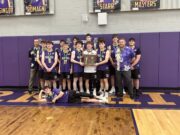Garrettsville – Every year for the past nine years, Friends of Melana (FOM) has held a 5K race to help fund research on childhood glioma treatment. The race is run annually at Garrettsville Summerfest and this year was the 9th year for the race. The group was originally a support group for Melana’s family while she was living with cancer and ultimately succumbed to the disease. Rather than disperse the group, Melana’s grandparents, Joyce and Norm Fashing wanted to do something to make Melana’s death not be in vain. They decided to shift the group’s focus to helping find a cure. Those in the group were on board with the idea, so the FOM went from support of the family to finding a cure.
Over the years, the group has held murder mystery dinners and the race. The dinner was struggling to draw in enough funds to make it worth the effort. So, they switched the dinner to a fall pledge campaign. Between the race and the fall campaign, the group has raised $155,520 and have combined their monies with their umbrella group Prayers from Maria (PFM). With PFM and FOM combining their monies, they’ve been able to accomplish so much.
Both groups have been diligently raising funds to help find a cure for Diffused Intrinsic Pontine Gliomas (DIPG). DIPG is a type of cancer that forms at the base of the brain near the brain stem. This type of cancer generally affects children from 5-10 years old. This type of childhood cancer has no cure and most succumb to it within two years. There are very few treatment options out there for children. They do radiation treatments to shrink the tumors, and chemotherapy is used with other biologic agents in multiple trials to see if they can find ways to improve the survival rates of patients with DIPG. The key word here is trials. The problem with this type of cancer is that there has been little research on the issue so there are very limited treatment options and many are experimental.
Lack of treatment options is one of the most frustrating things for parents. Treatment for children with DIPG is almost all experimental. The other thing that frustrates many is that out of the $5billion annual medical research budget only 4% is dedicated to childhood disease research and much less than that for childhood cancer. In order to obtain any research grants from government funds, researchers must provide significant positive preliminary research data. It takes funding to get the preliminary data so they can get a grant to complete the research. So how does anything get accomplished? By private groups like PFM and FOM.
These two groups’ fundraising efforts have made significant contributions to medical research teams getting larger grants to find a cure. The groups have been providing seed grants that have been used to obtain bigger research grants. Here is what the two groups together have accomplished.
• They have awarded a $50,000 grant to the DIPG All-Initiative/ National Institute of Health. This funding optimizes promising therapeutics prior to getting to the clinic. Their objective is to strengthen the rationale and improve efficiency of early clinical trials while providing clinical benefit to children with DIPG by expanding valuable pre-clinical research.
• A $100,000 grant was awarded to MetroHealth Medical Center in Cleveland, studying the family of proteins that can stop “egg cells” in tumor cells, which can be turned on to stop migration. This seed funding from PFM launched $3.3 million in supplemental funding from the National Cancer Institute and other funders to continue this valuable research.
• A $200,000 grant went to Dana-Farber Cancer Institute, that resulted in two tumor fighting drugs now being used in clinical trials.
• Another $250,000 Melana Matson Grant went to Case Western Reserve University’s team researching how nanotechnology can deliver more targeted and less toxic chemotherapy to the brain tumor site. This launched a $2.82 million National Institute of Health Grant.
• A $100,000 Josh Metzger Memorial Fox Trot Grant was awarded to the Cleveland Clinic for epigenetics research and identification of drugs that may make radiation more effective in children.
• An $80,000 Kasey Mikes Memorial Grant was designed to find desperately needed start-up funds and to encourage top young talent to commit to long-term focus on childhood brain cancer research. This grant was awarded to Carl Koschmann at the University of Michigan.
• Another $200,000 Brooks Blackmore Memorial Grant to Dana – Farber Cancer Institute for a national clinical trial to deliver the most promising therapies for patients with newly identified brain tumor subtypes. This will deliver brand new therapies directly to children fighting the most aggressive brain tumors.
• A $250,000 Jax Stone Memorial Grant was given to Washington University to study the impact that epigenetic mechanisms, which are required for normal sexual differentiation of essential brain structures and functions have on the genesis of pediatric high-grade glioma and the efficiency and developmental toxicities of epigenetic therapies.
• A $50,000 Kari McCloskey Grant was awarded to the Dana-Farber Cancer Institute for continued research developing targeted agents that attack specific aspects of DIPG. This study builds on groundbreaking findings from our past grants to Dana- Farber.
• The most recent was May 2019 PFM sponsored a think tank where 27 of the world’s top pediatric brain tumor researchers met to share cutting edge research. At this meeting, a $500,000 grant was announced to be awarded to inspire innovation in the field of pediatric cancer research, through the collaboration among multiple institutions and disciplines. The ultimate goal is to develop high risk, high reward, cutting-edge projects which will advance research and lead to new and better treatments for children who suffer from cancer.
As one can see, they have been busy making a difference in DIPG research. They are racing to find a cure and seeing the fruits of their labors. Although they are far from a cure, the faces of children lost to this disease keep them motivated to keep on keeping on. For more information on the cause one can go to www.stopkidscancer.org











